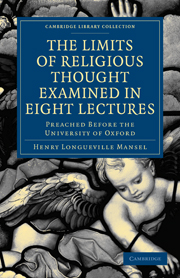 The Limits of Religious Thought Examined in Eight Lectures
The Limits of Religious Thought Examined in Eight Lectures Book contents
PREFACE TO THE FIRST EDITION
Published online by Cambridge University Press: 29 August 2010
Summary
It has been observed by a thoughtful writer of the present day, that “the theological struggle of this age, in all its more important phases, turns upon the philosophical problem of the limits of knowledge and the true theory of human ignorance.” The present Lectures may be regarded as an attempt to obtain an answer to this problem, in one at least of its aspects, by shewing what limitations to the construction of a philosophical Theology necessarily exist in the constitution and laws of the human mind.
The title selected may perhaps require a few words of explanation. In the expression, religious thought, the term thought is not intended to designate any special mode of acquiring or communicating knowledge; as if truths beyond the reach of thought could be attained by intuition or some other mental process. It is used as a general term, to include all that can be distinctly apprehended as existing in any man's own consciousness, or can be communicated to others by means of language. Those states of mind which do not fulfil these conditions are only indirectly examined in the following pages: but the very circumstance that such states, even granting them to exist, can neither be distinctly apprehended nor intelligibly communicated, renders them, whatever may be their supposed effects on individual minds, unavailable as instruments for the construction or criticism of any religious doctrine.
- Type
- Chapter
- Information
- The Limits of Religious Thought Examined in Eight LecturesPreached before the University of Oxford, in the Year M.DCCC.LVIII on the Foundation of the Late Rev. John Bampton, pp. xlv - lPublisher: Cambridge University PressPrint publication year: 2009First published in: 1867
